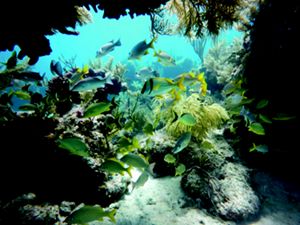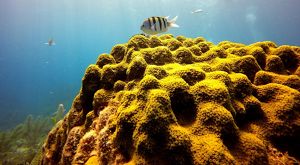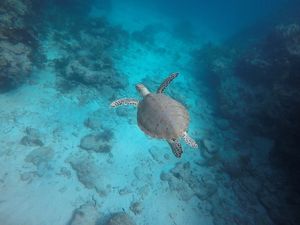Coral Reefs
View our latest insights related to coral reefs.

Protecting reefs and expanding restoration efforts through science and collaboration.
Coral reefs are under threat. From coral reef disease in Florida and the Caribbean to bleaching events fueled by rising sea temperatures, scientists estimate that unless we take immediate action, we could lose up to 90% of coral reefs within our lifetimes.
That’s why The Nature Conservancy works to champion the protection, restoration, monitoring and management of reefs across the globe. Coral restoration has grown from a single-species pilot project in 2004 to a large-scale operation to restore ecosystem balance to Florida’s Coral Reef and reefs around the world.
TNC is a key connector and scientific resource, offering our conservation partners science-based methods for protecting and restoring coral reefs. TNC has scientists and practitioners in the water across the planet, and we offer global training opportunities for reef managers through TNC’s Reef Resilience Network.
In Florida, we work with partners like NOAA, FWC, FDEP and the various restoration practitioners. We also work in collaborations like the Florida’s Coral Reef Resilience Program and with global groups like the Coral Restoration Consortium.




The Coral Restoration Consortium (CRC) aims to provide a community to share knowledge and bring together a global network of scientists, decision-makers, reef managers and coral restoration practitioners, all united by the mission to restore coral reefs worldwide.
TNC recently co-authored the Coral Restoration Consortium (CRC)'s Guide to Coral Reef Restoration. The guide helps global coral reef practitioners as they develop and scale field-based restoration programs. The guide shares global coral reef successes, highlighting lessons learned that scientists around the world can learn and use.
The CRC’s Guide to Coral Reef Restoration represents years of work and findings from our TNC experts in Florida, along with global scientists from Australia, Belize, the Caribbean, Colombia, Fiji, Saudi Arabia and other countries.

The science-based guidance combined with decades of team experience makes for an excellent and easy to read roadmap to bringing back our coral reefs.
Guide to Coral Reef Restoration
The guide dives into the factors and methods to consider for coral propagation, restoration site selection, nursery operations and coral harvesting.
Florida's Coral Reef is the largest coral reef ecosystem in the continental U.S., with its extensive shallow coral reefs spanning 358 miles from the Dry Tortugas near Key West, north along the Atlantic coast to Martin County. Science-based management practices and careful stewardship are critical to ensure the reefs’ healthy future.




Florida’s Coral Reef Resilience Program is leading an effort to make Florida’s Coral Reef healthier and more resilient to natural disturbance events.
The Florida Reef Resilience Program published a Resilience Action Plan for Florida's Coral Reef in 2021. The Resilience Action Plan identifies actions that should be implemented by reef managers, policymakers and reef users to improve the health of the reefs, with a significant focus on restoration efforts.
Florida’s Coral Reef Resilience Program (FCRRP) is the result of a merger between the TNC-led Florida Reef Resilience Program and the state’s disease response effort.
It is a partnership between TNC and: Biscayne National Park, Broward County, Dry Tortugas National Park, Florida Department of Environmental Protection, Florida Fish and Wildlife Conservation Commission, Florida Keys National Marine Sanctuary, John Pennekamp Coral Reef State Park, Martin County, Miami-Dade County, National Oceanic and Atmospheric Administration, Nova Southeastern University, Palm Beach County, and University of Miami Rosenstiel School of Marine and Atmospheric Sciences.







Our treasured coral reefs provide Florida with many benefits. Not only are they home to many species of marine life— including species listed as Threatened under the Endangered Species Act — they are also integral to Florida’s economy, supporting our tourism industry and commercial and recreational fisheries. Additionally, they act as a natural buffer for Florida’s shoreline, helping to reduce the power of waves and provide natural support for coastal resilience.
Coral reef communities are sensitive to threats that are linked to human actions, including pollutants that impact the health of the ecosystem and our commercial and recreational uses of the reef. Science-based management practices and careful stewardship are critical to ensure the reefs’ healthy future.

Sign up to receive Nature News and updates from Florida. Preview Nature News